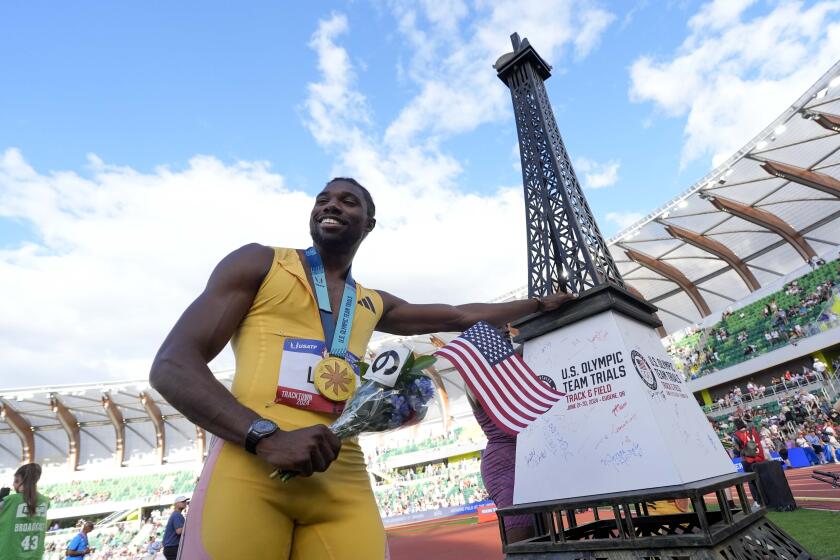In a Game of Love, Graf Eventually Became Liked
Steffi Graf was the most accomplished tennis player in the world, even while battling injuries, even while watching her father fight to stay out of prison.
She had won so much--too much, some said. Often it was written that Graf’s dominance had been bad for the game and that her aloofness had pushed tennis backward in popularity.
And yet, there was a day in Philadelphia. Graf had come, reluctantly, to speak about herself. It was at the end of a long year, 1996, and she was preparing for the season-ending Chase Championships.
Graf had won the U.S. Open a couple of months earlier and had been greeted with raucous applause and standing ovations and the imperious German had let tears flow. This was so uncharacteristic.
After that, when she walked down the streets in Manhattan, Graf found herself being patted on the back, found hands extended and words of appreciation being offered without the request of an autograph following.
“This is so surprising,” Graf would say later, in Philadelphia. “So unexpected. I never thought of myself as someone who people would feel close to and I never let my emotions out before. I did a little in New York and now, the reaction, it has been wonderful. But I never thought that I was someone people would like.”
On Friday in Heidelberg, Germany, near where she had grown up, where her father, Peter, had sawed off the handle of an adult tennis racket and given it to his serious, quiet child, Graf announced that she would play no more professional tennis.
Her desire was gone, she said, her intense need to compete missing. Graf said she found herself thinking more happily of reading vacation travel brochures than of playing the U.S. Open and so there won’t be a real chance to say goodbye.
Which is what Graf wants.
Certainly her career is complete. Graf won 22 Grand Slam events, two shy of Margaret Court’s record. She won 107 tournaments and was ranked No. 1 for 377 weeks. She won an Olympic gold medal in 1984, when tennis was an exhibition sport in Los Angeles, and she won gold again in 1988, completing what was called a “Golden Slam,” meaning she had swept the Australian Open, French Open, Wimbledon, the U.S. Open and the Olympics.
Back then Graf was not loved. Her face was set sternly and she exhibited minimal emotion. After a win, she would whip off the bandanna she always wore around her forehead and offer a quick handshake to the vanquished.
It was not only her domination of the sport for so much of the 1990s that made Graf, if not a villainess, then at least unloved. When a German named Guenther Parche stabbed Monica Seles in the back during a match in Hamburg, Germany, and then said he did it so that Graf could be No. 1 again, Graf was criticized for not being publicly sympathetic enough to Seles.
In fact, Seles had won nine of the previous 10 Grand Slam events she had played and had taken over the No. 1 ranking. She was sidelined for 2 1/2 years after the stabbing incident and Graf spoke to her rival only once in that period.
“I never knew the right thing to do then,” Graf said. “I didn’t know if Monica wanted to see me. It was a very hard thing for both of us.”
Graf said that she feels perfectly fit and that it is not an injury that is forcing her out. But it was clear this month at La Costa, when Graf was forced to quit in the third set of a match against Amy Frazier because of a pulled hamstring, that she was frustrated that her 30-year-old body would not be perfect anymore.
The day before, she spoke of how much she missed running in her workout regimen. But running led to many other injuries.
When Graf had beaten Seles in the 1995 U.S. Open final, the first Grand Slam tournament Seles had played since the stabbing, the New York crowd was loudly pro-Seles. But Graf cried after the match, the first time Fraulein Forehand, as she had been called, seemed to have emotions.
The next year, Graf beat Seles again in the Open and this time was rewarded with the loud cheers. This time Graf sobbed. Her father was in jail, her body had begun to break down and now, finally, she realized that if, given a chance, people liked her.
This month at La Costa, she said she regretted saying, after her stunning victory over Martina Hingis in the final of the French Open in June, that she had just played her last French Open. She had said, again, after losing to Lindsay Davenport in the Wimbledon final a month later, that she would not return to Wimbledon.
Her regret, Graf said, wasn’t about her decision. It was because, by saying it out loud, “people want to know when, when, when. They won’t quit asking the question.”
Wonderfully, though, Graf found out how much she meant to the game. The Paris crowd was so pro-Graf, Hingis crumbled into a whining brat who had to be dragged to the trophy presentation by her mother. Davenport won her first Wimbledon title but graciously accepted that it was Graf whom the Centre Court crowd wanted to win. One last time.
And, for the last time, at least for us, Graf cried. She is human. Always has been.
Diane Pucin can be reached at her e-mail address: diane.pucin@latimes.com.
More to Read
Get our high school sports newsletter
Prep Rally is devoted to the SoCal high school sports experience, bringing you scores, stories and a behind-the-scenes look at what makes prep sports so popular.
You may occasionally receive promotional content from the Los Angeles Times.






